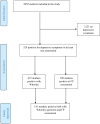Postpartum depression screening in mothers and fathers at well-child visits: a feasibility study within the NASCITA cohort
- PMID: 37355274
- PMCID: PMC10314581
- DOI: 10.1136/bmjopen-2022-069797
Postpartum depression screening in mothers and fathers at well-child visits: a feasibility study within the NASCITA cohort
Abstract
Objective: To assess the feasibility of the family paediatrician's (FP) role in identifying the signs of postpartum depression in parents in time to guarantee child well-being.
Design, setting and participants: Data for this observational prospective study were collected within the NASCITA (NAscere e creSCere in ITAlia) cohort. During the first visit, paediatricians collected sociodemographic data regarding the parents and information about their health status, the pregnancy and the delivery. Whooley questions were administered during the first and second visits (scheduled 60-90 days after childbirth). Moreover, on the third visit (5-7 months after childbirth) the FP was asked to answer 'yes' or 'no' to a question on the parental postpartum depression, based on his knowledge and on the acquired information.
Results: In 2203 couples who completed the assessment, 529 mothers (19.9%), 141 fathers (6.3%) and 110 (5%) couples reported any depressive symptomatology. Of these, 141 mothers (5.3% of the total sample) and 18 fathers (0.8% of the total sample) were classified as 'likely depressed'. An association was found between maternal postnatal depressive symptoms and having a diagnosed psychiatric disorder during pregnancy (OR 9.49, 95% CI: 3.20 to 28.17), not exclusively breastfeeding at hospital discharge (OR 1.76, 95% CI: 1.19 to 2.61) and the presence of child sleeping disorders at 3 (OR 2.46, 95% CI: 1.41 to 4.28) and 6 months (OR 2.18, 95% CI: 1.37 to 3.47). Another significant predictor of postpartum depression was being primiparous (OR 1.99, 95% CI: 1.31 to 3.02). Concerning the fathers, a significant association was reported only between likely depressed fathers and child sleeping disorders at 3 months (OR 7.64, 95% CI: 2.92 to 19.97). Moreover, having a likely depressed partner was strongly associated with depressive symptoms in fathers (OR 85.53, 95% CI 26.83 to 272.69).
Conclusions: The findings of this study support the feasibility of an active screening programme for parental postnatal depression during well-child visits as an integral part of postpartum care.
Trial registration number: NCT03894566; Pre-results.
Keywords: Depression & mood disorders; MENTAL HEALTH; PERINATOLOGY.
© Author(s) (or their employer(s)) 2023. Re-use permitted under CC BY-NC. No commercial re-use. See rights and permissions. Published by BMJ.
Conflict of interest statement
Competing interests: None declared.


